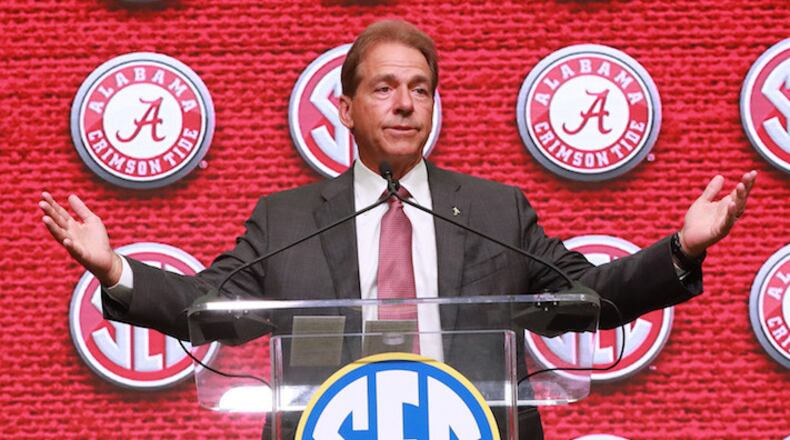The same predicament arises every summer. With a new season approaching, college football must once again ask: How do we beat Alabama?
The Crimson Tide dynasty has now stretched nearly a decade with five national championships and counting.
In the Southeastern Conference, where rivals face this juggernaut on a regular basis, no less than four schools have cherry-picked coaches who used to work for Nick Saban.
But if you're looking for quick answers, don't ask Jeremy Pruitt, who jumped from Tuscaloosa to Tennessee in the offseason. When asked if his former boss offered him parting wisdom, Pruitt said: "You think coach Saban is going to give me any advice?"
Championships are only one measure of Alabama's dominance. The Crimson Tide, who won national titles in the 2009, 2011, 2012, 2015 and 2017 seasons, have three losses in the last three seasons. One of the losses came in the last seconds against Clemson in the 2016 championship game.
Since 2008-09, Alabama has won 90 percent of its games.
"You have to play lights-out to beat a team like that," Mississippi State quarterback Nick Fitzgerald said.
Fitzgerald might sound simplistic, but the formula behind Alabama's success isn't exactly rocket science.
Two seasons ago, quarterback Jake Browning and his Washington team lost to the Crimson Tide in a College Football Playoff semifinal. He describes his own conference — the Pac-12 — as a league of varied schemes ranging from Stanford's bullish ground game to Washington State's pass-crazy spread.
Alabama is the epitome of what Browning sees as a basic, Southern approach to the game.
"A lot of the SEC is, 'My players are better than your players, so we're going to beat you,' " he said.
Saban has forged a reputation as a master recruiter, attracting the biggest and fastest five-star players to his program. This raw talent shows up most clearly on the defensive side of the ball.
The Crimson Tide have ranked among the top 5 defenses in the country in eight of the last 10 seasons. In 2016, they scored 11 touchdowns on interception and fumble returns.
Arizona State coach Herm Edwards mentions something even more impressive.
"How they stop (opponents) is really simple," Edwards said. "They get them in bad downs. They play really good in the red zone."
This consistency is evidence of another crucial dynamic: When all those top-rated recruits arrive in Tuscaloosa, they enter a program where the coach is fanatical about details.
"How we work at 'Bama, everything, it's just different," linebacker Anfernee Jennings said. "You know when you come to 'Bama, it's a different environment."
Devotion to preparation was evident in key plays from two recent national title games.
Before the championship game of the 2015 season, the coaching staff noticed something about Clemson's kickoff return scheme. Saban actually smiled on the sideline — a rarity — after calling a fourth-quarter onside kick that made the difference in a 45-40 win.
Last season, with his team trailing Georgia 13-0 at halftime, he turned to an unproven freshman at quarterback in the second half.
Calling on Tua Tagovailoa might have seemed like a desperation move, but it wasn't. Saban had prepared — and practiced — all season for the possibility that an opposing defense might shut down his run-oriented starter, Jalen Hurts.
Tagovailoa, possessing a better arm, secured a 26-23 victory with a long touchdown pass in overtime.
"Nick is the best coach in college football," South Carolina coach Will Muschamp said. "From a scheme standpoint, from a recruiting standpoint, from a development standpoint — you name it, he does an outstanding job."
Several teams have made a run at Alabama in recent seasons, including Clemson, Ohio State, Georgia and — in the form of two conference upsets — Mississippi.
Still, the Crimson Tide appear poised for yet another title run, hovering at or near the top of early betting lines. The coaches preseason poll has them at No. 1 by a wide margin.
SEC rivals know what that means. As Auburn coach Gus Malzahn put it: "You've got to beat them ... that's just part of the job description."
Former Saban assistants hired as head coaches include Kirby Smart at Georgia, Mark Dantonio at Michigan State and Jimbo Fisher, who worked under him at Louisiana State and has now taken over at Texas A&M. Muschamp, another protege, understands why major programs harvest from the Saban coaching tree.
"Athletic directors are always looking for the next mold of what that could be," the South Carolina coach said. "When you work for coach Saban, it's a total education in the game of football, recruiting, all the things that you've got to do to be successful."
Pruitt, who spent last season as Alabama's defensive coordinator, added that "you'd better write down everything you can, you'd better take it all in," while on the Alabama staff.
Asked about his former assistants, Saban said he tells them to "be who you are" when they move on. He insists that his door remains open.
"There have been many occasions when the guys that are coaching other places, even in our league, call and ask questions," he said. "Sometimes I call them and ask for their advice."
This supposed give-and-take hasn't helped much, with assistants going 0-12 against Saban during his Alabama tenure. Muschamp sounds almost weary when he says: "Somebody's going to eventually beat him."
The rest of the country knows the feeling.
About the Author
Keep Reading
The Latest
Featured


